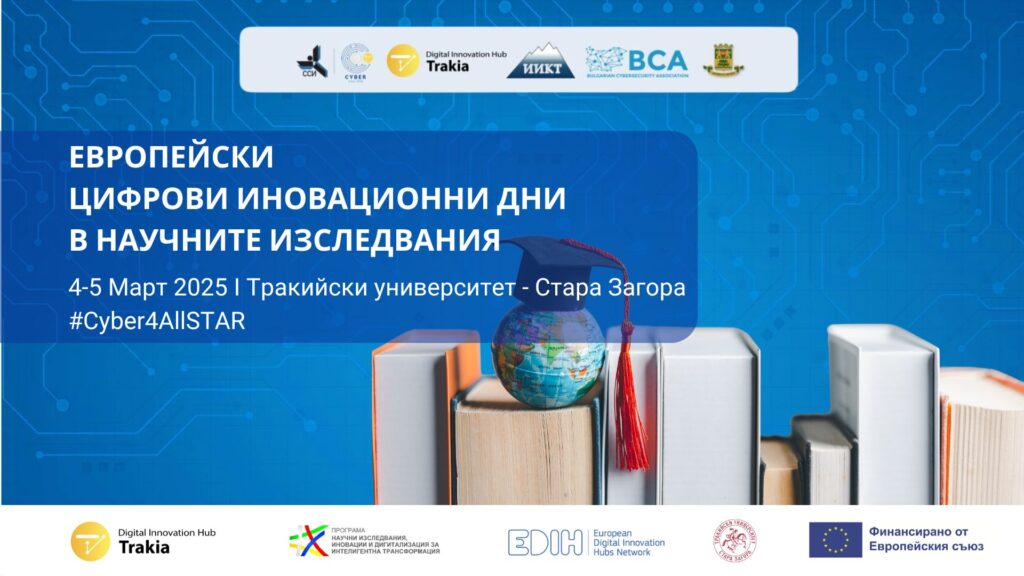Research and development (R&D) is at the heart of the innovation that drives companies’ progress and competitiveness. However, due to the sensitive nature of this research, the data generated is a prime target for hacking attacks and is subject to internal and external threats.
On 4-5 March 2025, the consultancy events “European Digital Innovation Days in Research”, organised by the EDIH “Trakia” under the Cyber4AllSTAR project, took place at the University of Thrace – Stara Zagora and were dedicated to digital transformation and cybersecurity in research.
The two-day forum brought together leading experts in cybersecurity, artificial intelligence and digital technologies who presented the latest trends and innovations. Participants had the opportunity to engage in discussions, workshops and presentations covering a wide range of topics.
The event started with opening remarks by Dr. Hristian Daskalov, Chairman of the Board of the EDIH “Trakia”, and Prof. Dr. Dobri Yarkov, Rector of the University of Trakia. They stressed the importance of innovation in the digital age and the need for close cooperation between different sectors. 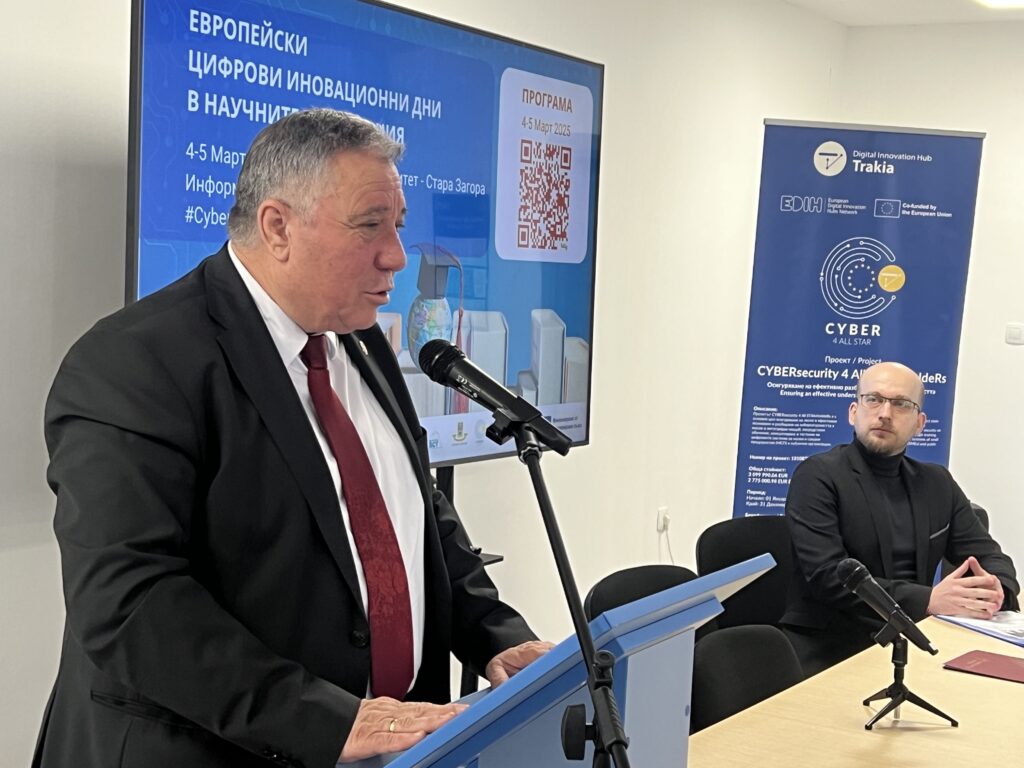
From left to right – Prof. Dr. Dobri Yarkov, Dr. Hristian Daskalov
The first panel, dedicated to the profession of Cyber Security, discussed the opportunities for academic and professional development in the field, presenting master’s programs and practical guidelines for training. Prof. Ilin Savov, together with Assoc. Boyan Zhekov and the cyber security expert Yasen Tanev, held an interesting discussion on the importance of the profession and how it will be a crucial part of forensic science and research. 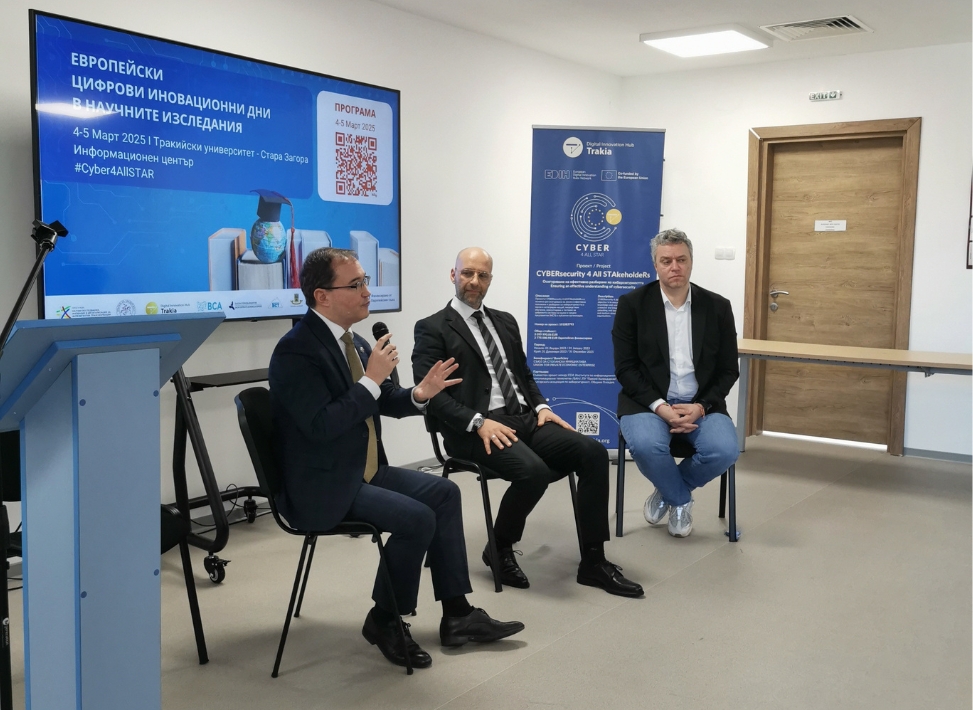
From left to right – Dr. Engr. Boyan Jekov, Prof. Ilin Savov, Yasen Tanev
The topic of cybersecurity continued with a discussion on the challenges facing higher education institutions. Spas Ivanov, Kiril Grigorov, Dr. Miroslav Mitev, Assoc. Prof. Dr. Georgi Penchev and other speakers presented best practices and innovative solutions to increase security in educational institutions, as well as on the offer of training programs in the field. Various opportunities provided by higher education institutions were presented. A discussion was held on their role in training future experts in the field and how they themselves should protect their infrastructure and knowledge.
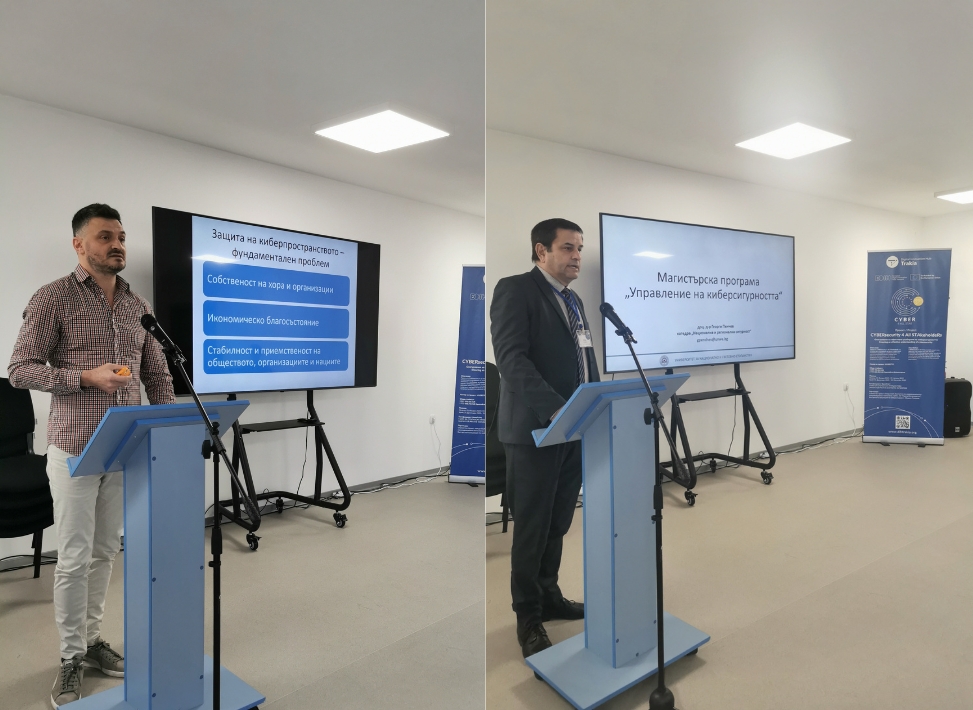
From left to right – Dr. Miroslav Mitev, Assoc. Prof. Dr. Georgi Penchev
The lunch session covered innovations in cybersecurity, focusing on user validations and proactive approaches to protect SCADA systems, presented by Stefan Tafkov and Assoc. Prof. Dr. Zlatogor Minchev.
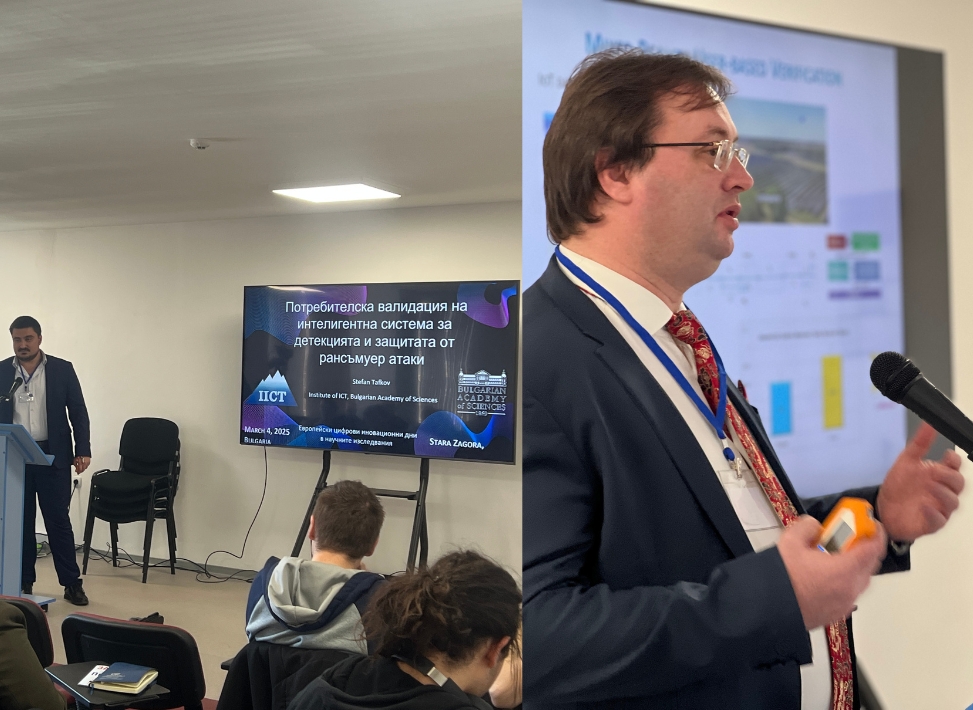
From left to right – Stefan Tafkov, Assoc. Prof. Dr. Zlatogor Minchev
During the first afternoon session, the opportunities and challenges related to the provision of grant support to business and the public sector within the framework of EDIH “Trakia” were discussed. Dr. Hristian Daskalov presented the support programme and its role in supporting innovation projects in different sectors. He focused on the benefits for businesses and public organisations of using the services provided and highlighted the main challenges related to the effective implementation of these grants.
Several experts took part in the session that followed, which included an overview and analysis of the results achieved so far. Kiril Grigorov presented on the development of the EDIH Trakia Cyber Range and how this project is turning from a vision into reality, providing valuable training and infrastructure for cyber security. Dr. Rumyana Atanasova discussed the key partnerships and communications that support the success of EDIH, and Yasen Tanev shared the achievements and challenges in the sales process, with a focus on innovation deployment. Assoc. Prof. Dr. Georgi Penchev presented an analysis of quality management in the services provided, while Mira Dragieva concluded with an overview of the financial aspects and administrative processes that ensure project stability.
The program continued with the inclusion of as. Ivan Blagoev from the Institute of Information and Communication Technologies at BAS, who presented a model for cyber security audits, as well as the provision of consulting and training services. He demonstrated best practices from companies such as Webcentric, Contipso and GATE Institute. Ivaylo Blagoev, also from BAS, presented an e-course on cyber hygiene, which aims to train participants on basic and advanced techniques for protection in the digital environment, and Peter Kanchev, a cyber security lecturer and trainer at EDIH “Trakia”, presented the advantages and difficulties of conducting training for small and medium-sized enterprises (SMEs).
This part of the program focused on data protection, collaboration between business and academia, and social engineering. Pavlin Koldamov, a technical engineer from Fortinet, opened the session with a presentation on data protection and innovation, focusing on current challenges and solutions in cybersecurity.
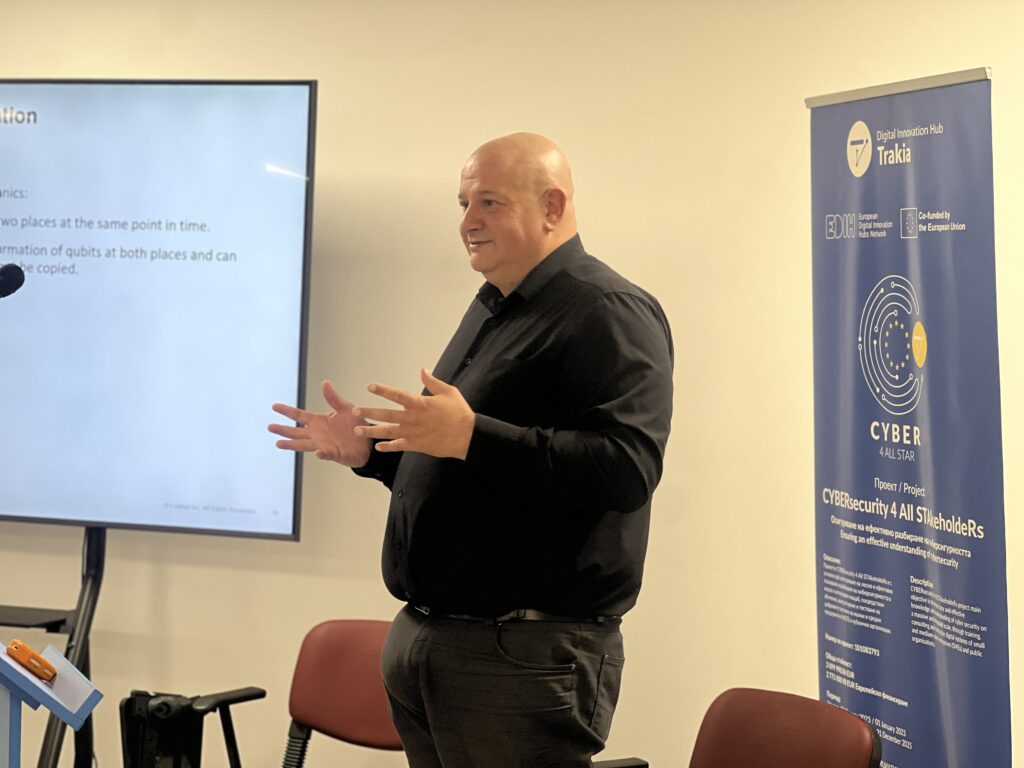
Pavlin Koldamov
Next, Neika Kisova, Public Sector Account Manager at Fortinet, presented successful examples of collaboration between business and academia through digital innovation, highlighting the role of innovation in strengthening security.
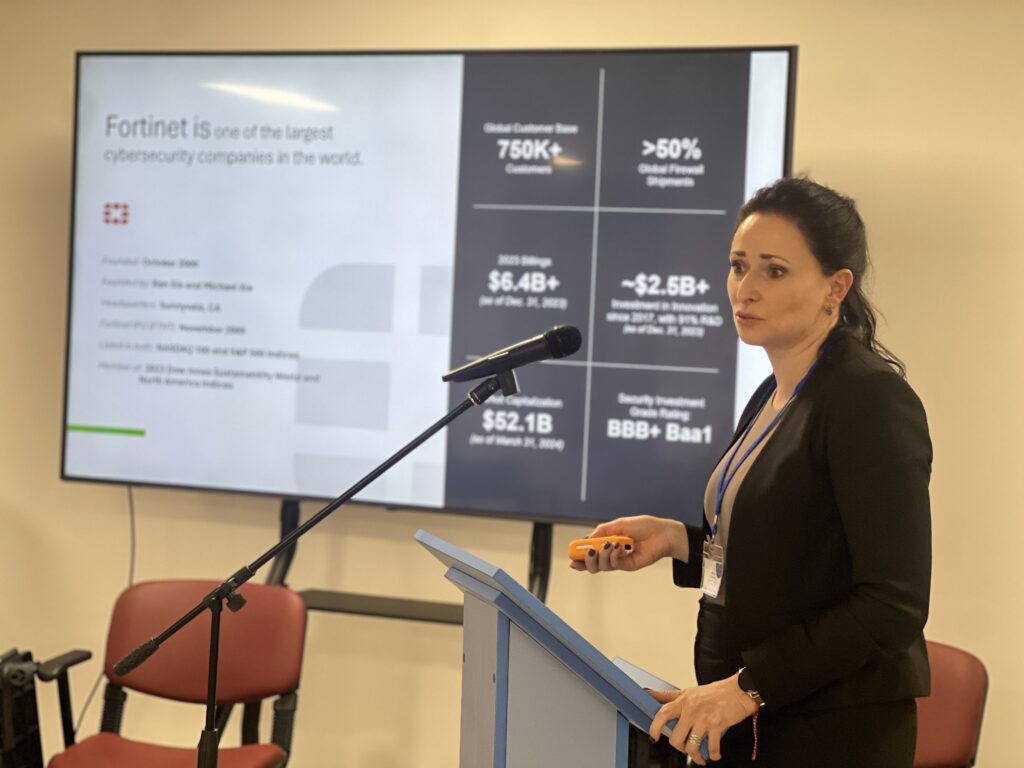
Neika Kisova
The final part was dedicated to social engineering. Moderator Dr. Hristian Daskalov opened the panel with a presentation of the main threats and techniques of social engineering. Dimitar Grigorov from Protecto Solutions presented an innovative Bulgarian patented system for protection against visual surveillance and malware tracking. As a finale, Peter Kanchev conducted an interactive workshop that engaged participants in recognizing and countering social engineering.
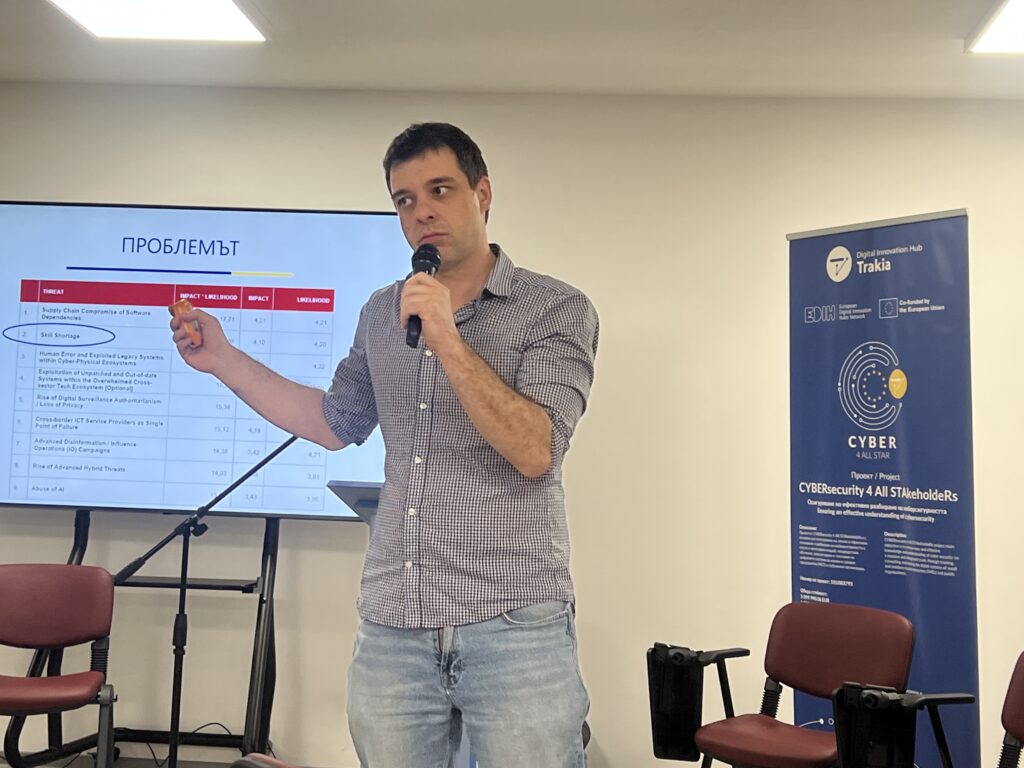
Peter Kanchev
On 5 March, the first session of the second day was dedicated to the future of EDIH 2.0 and the support that will be provided to business and the public sector over the next three years. Dr. Hristian Daskalov opened the session by presenting the vision for the development of EDIH Trakia and its role in supporting innovation and digitalization in different sectors.
Mira Dragieva from the Union for Economic Initiative shared the type of support that will be offered to businesses through the new services of EDIH, stressing the importance of cooperation between the public and private sectors. Assoc. Prof. Dr. Zlatogor Minchev from the Institute of Information and Communication Technologies at the Bulgarian Academy of Sciences discussed the technological challenges and innovations in cybersecurity that will be leading in the coming years.
Ivan Blagoev presented on how artificial intelligence will be used for testing, auditing and consulting services related to cybersecurity, while Ivaylo Blagoev focused on the implementation of AI in e-learning, which will facilitate skills development in digital security.
The final part of the session was dedicated to customer feedback and their satisfaction with the services provided by EDIH Trakia. Assoc. Prof. Dr. Georgi Penchev presented an analysis of the feedback and focused on the improvements that will be made to better serve and develop the center in the future.
The next session focused on future development directions, partnerships and co-funding opportunities for EDIH Trakia projects and services to support small and medium enterprises (SMEs) and the public sector. Irena Mladenova presented proposals for collaboration with the European Digital Innovation Hubs (EDIC) network and other organisations working for digital transformation in Europe. Participants contributed by generating new ideas and proposals to address the challenges and opportunities faced by EDIH Trakia, as well as innovative solutions and proposals for new projects.
The afternoon session started with the participation of Todor Mladenov, Executive Director of Sofia Tech Park, who presented to the newly joined foreign visitors the importance of cyber security and the opportunities provided to businesses by Sofia Tech Park. Assoc. Prof. Dr. Velizar Shalamanov answered questions on the challenges facing the academic sector in Bulgaria, while Pavel Ivanov from the Institute of Public Administration addressed the topic of innovation in the public sector.
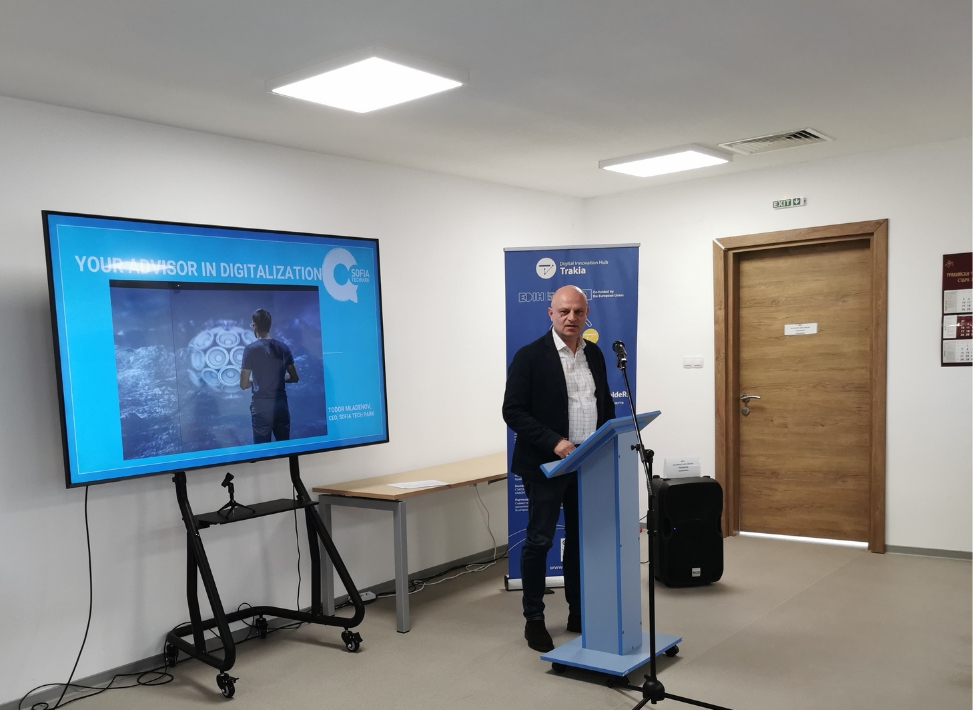
Todor Mladenov – Executive Director of Sofia Tech Park
Ivan Draganov from the GATE Institute made a presentation on Big Data, its use for creating smart cities, and the Institute’s recent achievements. Irena Mladenova from BAS presented the CODE project, aimed at creating an ecosystem and laboratory for sustainability in the digital space.
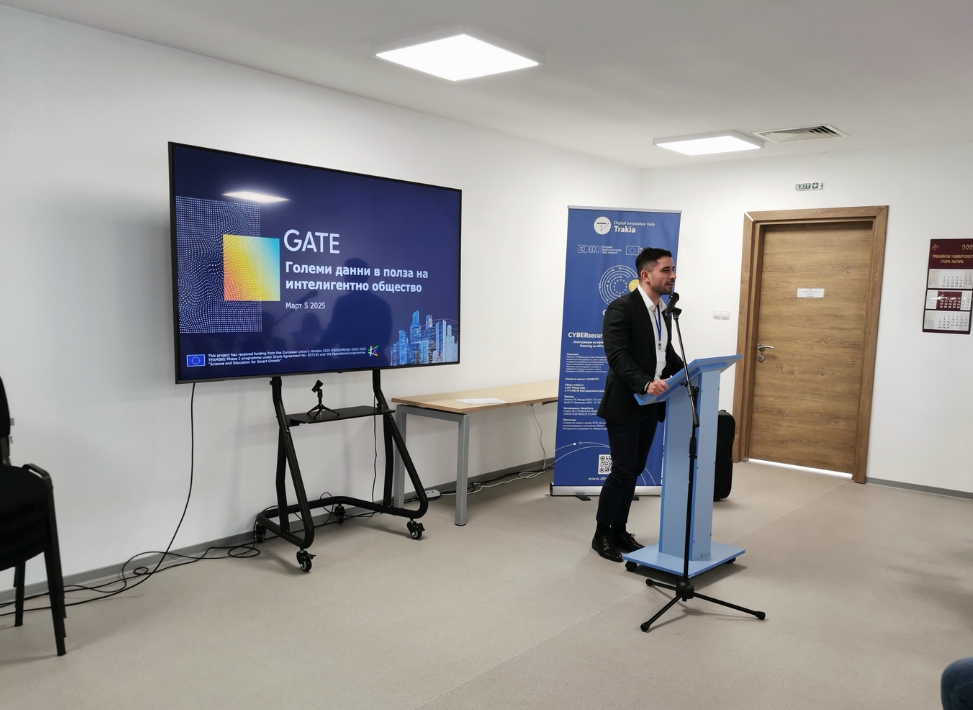
Ivan Draganov from the GATE Institute
One of the most interesting good practices in the field of collaboration between the academy and the private sector was presented by Dr. Maria Yurukova from the Department of European Studies at Sofia University. Kliment Ohridski” and Nesin Veli from Identrics, who presented a developed system for verifying the authenticity of information. Dr. Yurukova stressed the importance of collaboration between the academic sector and private business for the development of innovative digital tools and how these partnerships can accelerate the deployment of AI-based solutions in various digital applications.
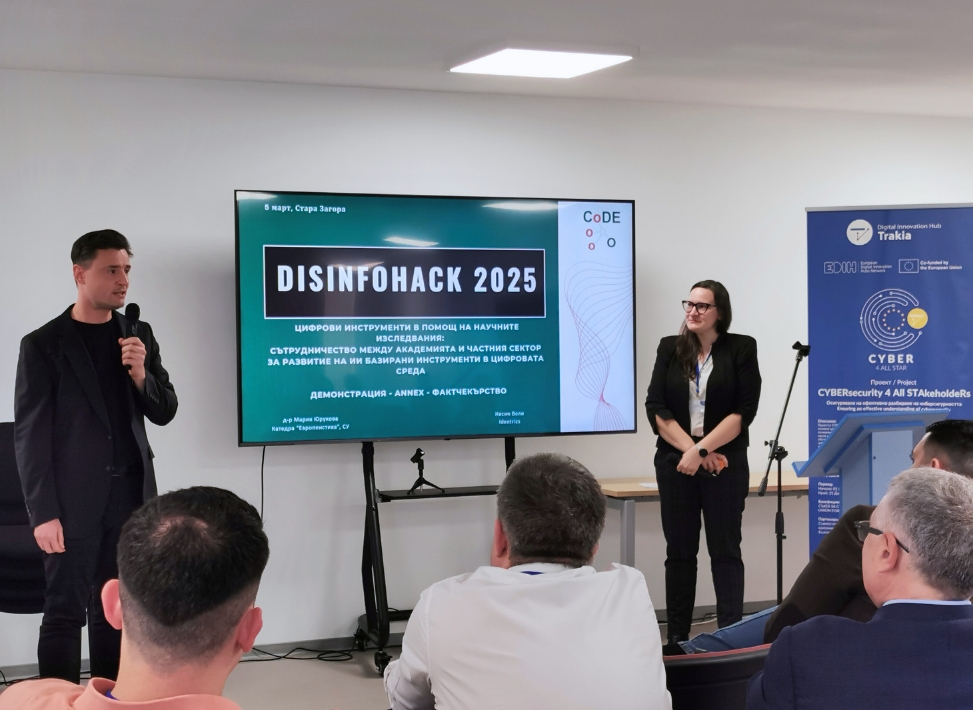
From left to right – Nesin Veli (CEO), Dr. Maria Yurukova
This was followed by the session “Artificial Intelligence and Deep Technologies to Support Academia, Business and Public Sector”. Kristina Eshkenazi, Chair of the Board of AI Cluster Bulgaria, started with a presentation on the topic “The Cost of Artificial Intelligence” and the concept of “future by design”, emphasizing the importance of strategic planning when implementing AI technologies.
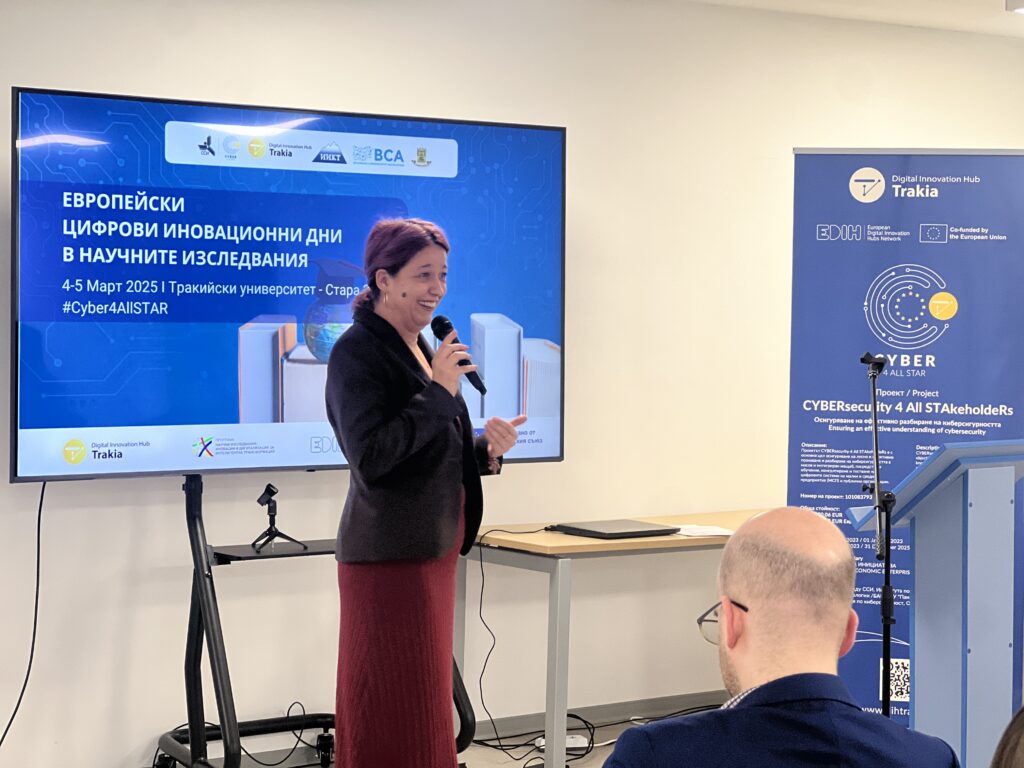
Kristina Eshkenazi
Pavel Ivanov from the Institute of Public Administration presented the innovation “hIPA” – the first chat bot in the public administration, which aims to improve the interaction between citizens and the public sector.
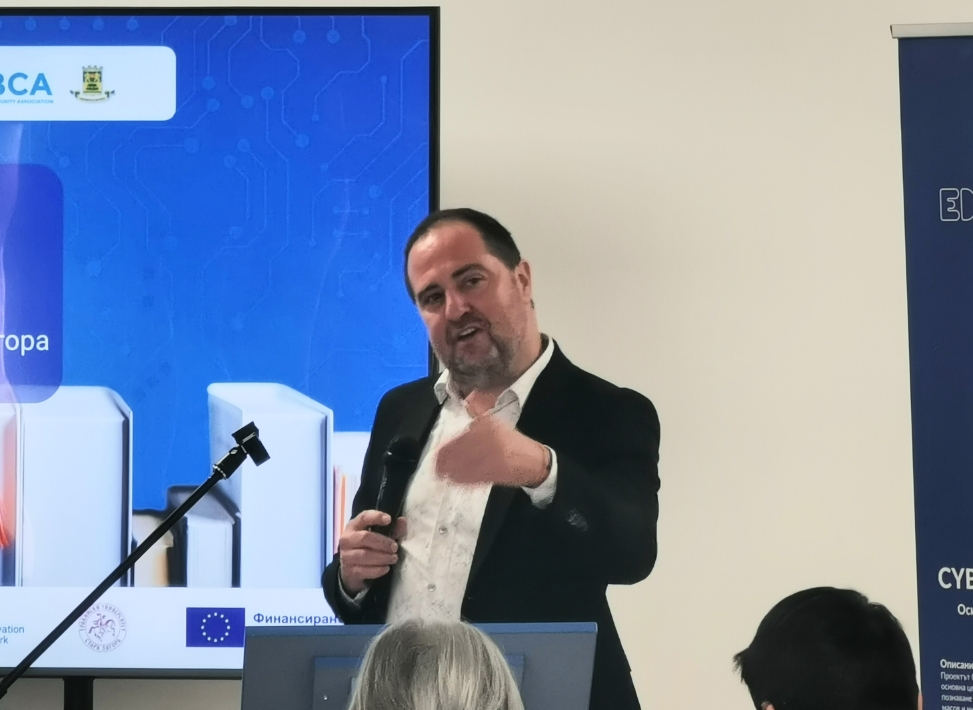
Pavel Ivanov
Akseniya Tileva, Deputy Mayor of Kazanlak Municipality, presented the project “How virtual reality brings us back to the ‘World of the Thracians’”, demonstrating the innovative approach to promoting cultural heritage. At the end of the session, Assoc. Prof. Dr. Toncho Penev from the Department of Ecology and Zoohygiene at Trakia University – Stara Zagora revealed the application of digital technologies in cyber-physical systems for intelligent management of animal breeding complexes, highlighting the role of artificial intelligence in agriculture.
The programme continued with a presentation by Anton Todorov, CEO of New I JSC, who presented the funding opportunities for new R&D projects and how his company can support businesses in applying for them.
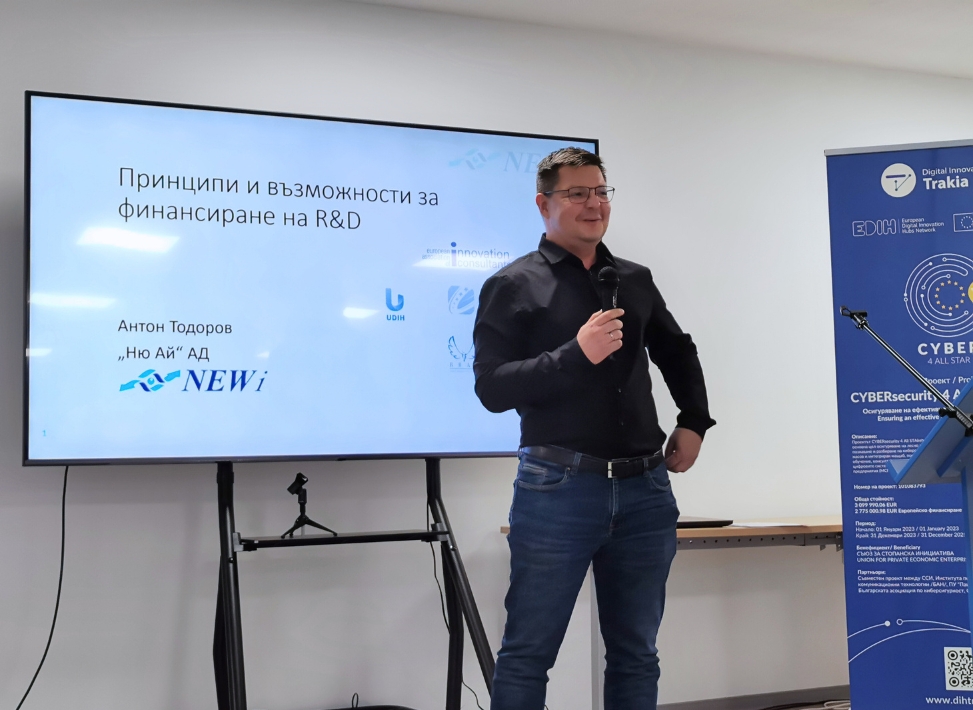
Anton Todorov – CEO
In the last part of the day was organized the traditional webinar, moderated by Kristina Eshkenazi and Hristian Daskalov. The session “Development in AI in Europe” presented innovations and innovative projects related to artificial intelligence in the context of Europe.
Max Reddell, Director of Advanced Artificial Intelligence at the Center for Future Generations, presented the concept “Building CERN for AI: An Institutional Blueprint”, which looked at how a CERN-like institutional structure for AI development could be built to foster collaborations and innovation in the field.
The idea is to create an innovation hub that brings together scientists, researchers and industry partners to collaborate on the development of advanced AI technologies and applications. Similar to CERN, where physicists work together on fundamental scientific questions, “CERN for AI” would be a platform for sharing knowledge, resources and expertise in AI research.
Isodor Mlakar from the Faculty of Electrical Engineering and Computer Science at the University of Maribor presented the SOLARIS project, which seeks to strengthen democratic participation by exploring the impact of generative AI, especially so-called deep fakes.
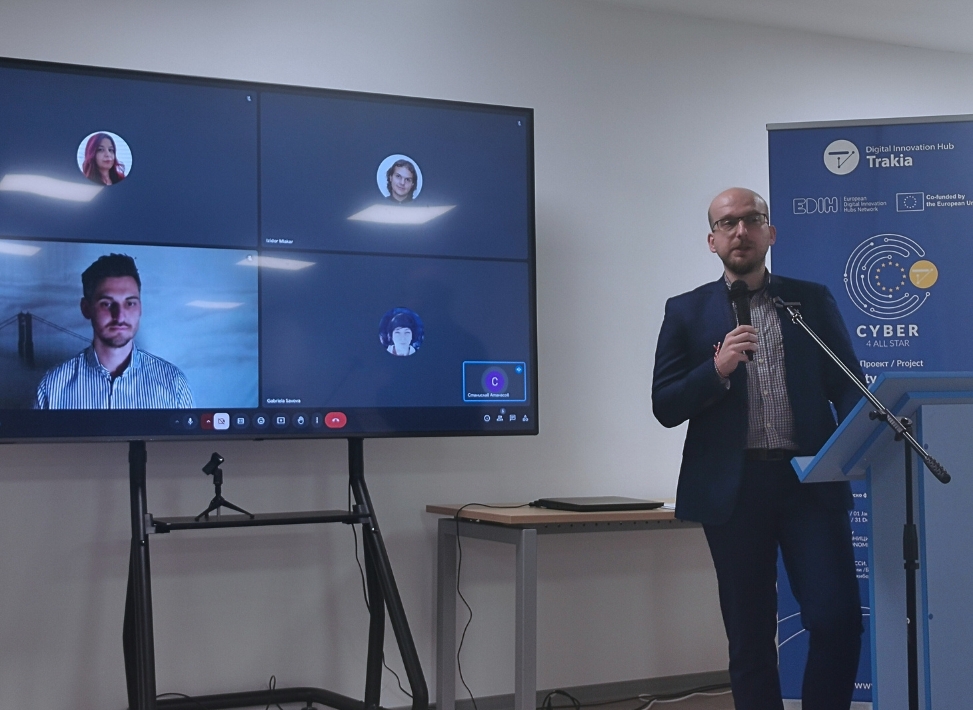
Max Reddel, Izodor Mlakar, Kristina Eskenazi and Hristian Daskalov
The project is motivated by the problem of the spread of fake news, which is essential for the well-being of democracy in the EU. Citizens searching for news online are exposed to a huge amount of information, which facilitates the spread of conspiracies and polarisation of society. SOLARIS aims to strengthen citizens’ democratic participation by analysing the risks associated with artificial intelligence.
Kristina Eshkenazi and Hristian Daskalov had an interesting discussion with the online presenters and focused on the importance of strategic initiatives in Europe for the development of AI and the role of the public and private sectors in this endeavor.
The session provided a platform for the exchange of ideas and best practices, highlighting the importance of collaboration and innovation to advance AI in Europe.

